By clicking submit, I consent to my personal data being collected, stored, and processed by Think Pacific in accordance with our Privacy Policy.
Think Pacific - Environmental Responsibility
Our approach reflects our responsibility to both the environments we operate in and the communities who host our programmes.
As an organisation committed to the principles of Regenerative Travel, we recognise that our environmental footprint must be carefully assessed and responsibly managed. We have therefore developed an Environmental Responsibility Strategy that prioritises measurable reduction of emissions and resource use, while ensuring that any unavoidable impact is balanced through the most ethical and sustainable means available.
Our aim: to play our part in a just transition to a net zero future, and to protect the very communities and ecosystems where we work.

✅ Carbon Offset Experiences: Every participant’s emissions are measured and offset through verified projects.
✅ Hands-On Action: With our partnerships with local NGOs and conservationists, we engage travellers directly in a local initiatives, providing funding, hands-on-support and promoting local advocacy. From coral planting to mangrove reforestation and plastic recycling.
✅ Climate-Conscious: We invest in low-emission travel, plastic-free operations, regenerative accommodation (such as homestay and locally owned lodgings) and sustainable local food.
✅ Local-Advocacy: Activities are guided by the communities who know their home best. Gain insight from local people. Perspectives that inform and educate. Real lessons learned up close, help everyone make better long term choices.
✅ Innovation & Resilience: We champion and invest in grass-roots eco-tourism and social impact projects that create lasting change.

Our long term strategy is built on four simple principles:
-
Reduce first – We prioritise alternatives and smarter travel decisions wherever possible.
-
SAF / Transition – Catalyse the sustainability transition through investing in sustainable fuel
-
Removals – Invest in Carbon Removals
-
Justice – We support adaptation projects in the Pacific and Asia, where the impacts of climate change are felt most.
As an organisation, we commit to an internally generated climate fund, allocating a calculated proportion of each participant’s fee to serving carbon offsetting efforts. This fund will then be utilised for strategic, data led investment under the best practice guidelines from ICVCM Core Carbon Principles and B Lab.
This ensures we have a predictable, ring-fenced fund for climate action each year. Offsetting the negative impact of emissions through reinvestment opportunities is a primary strategy for us. This acknowledges the current environmental impact that significant air travel creates, and works to actively balance out our organisational carbon footprint whilst playing our part in the achievement of a more sustainable future.
What follows is ensuring that the fund is appropriately utilized to invest in areas that will have the greatest impact.
We know flights are our biggest impact. For Think Pacific, international air travel is essential to deliver our programmes, but it also makes up the largest part of our carbon footprint. That’s why we’re focused on finding smarter, evidence-based ways to reduce these emissions wherever possible, and to explore innovative solutions that could one day turn this challenge into a net positive.
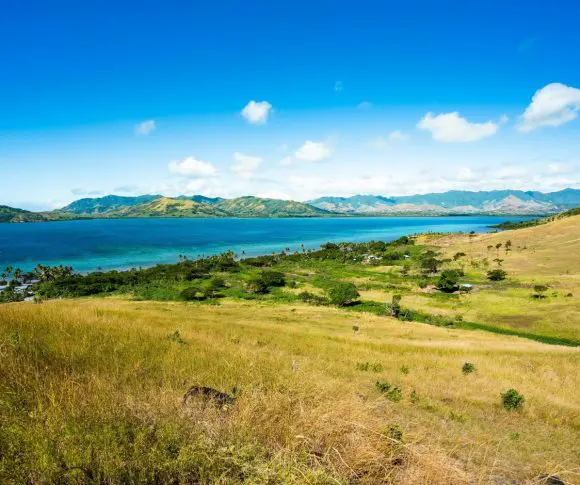

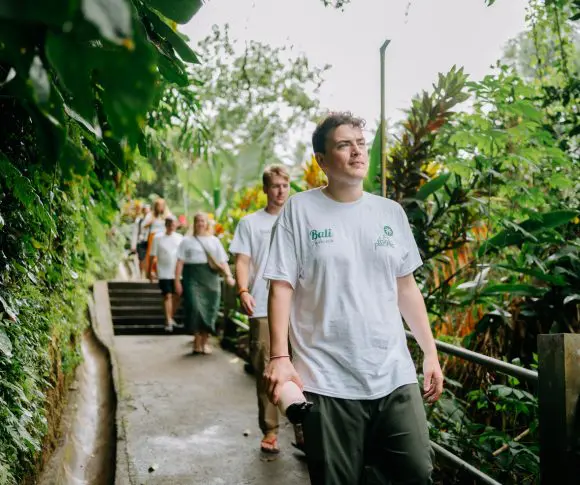
Flights are uniquely hard to decarbonise. There are no zero-emission planes yet, and for almost all participants, flights are essential to join our projects. We don’t shy away from this. Instead, we face it head on.
For Example: One return flight to Fiji from the UK creates around 5.9 tonnes of CO₂e… In 2024, our participant flights created over 4,600 tonnes of CO₂e.
- Aviation fuels have few alternatives in the short term. Unlike electricity or land transport, there’s no commercially viable zero-emission jet yet. So as we are reliant on international flights, we face a stubborn emissions “hotspot.”
- Offsetting schemes do not equal “reduction”. Buying credits doesn’t actually reduce our own emissions, it funds climate action elsewhere. That means offsetting is, at best, a bridge solution, not a fix.
- Standards have caught up: The science-based target initiative (SBTi) and B Lab both now say:
- Reduce what you can in your own footprint.
- For residual, unavoidable emissions (like flights people must take), it’s legitimate to finance “beyond value chain mitigation” (i.e., high-integrity carbon projects), as long as these claims are not oversold or exaggerated.
- Credible offsetting is no longer a gimmick if done transparently and in line with ICVCM/VCMI. It becomes one lever in a broader plan.
Carbon offsetting is the process of compensating for the negative impact of emissions being released by investing in emissions being reduced elsewhere from another source or investment for net positive future benefit. It is an effective way of reducing contribution to climate change while still utilising services that release carbon and other pollutants into our earth’s atmosphere such as flight and manufacturing in a period where otherwise operations may not be possible.
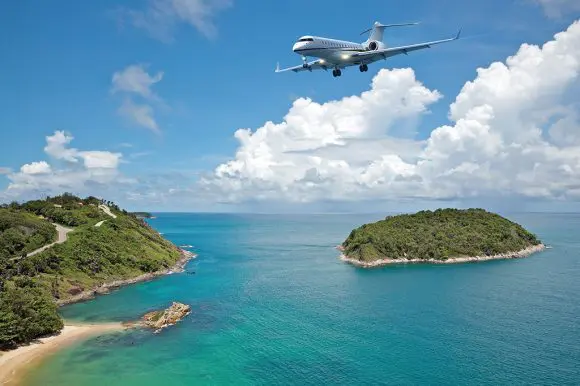
SAFc (Sustainable Aviation Fuel Certificate) is a market-based solution that represents the environmental attributes of Sustainable Aviation Fuel (SAF), decoupling them from the physical fuel. This allows companies to purchase and claim the emission reductions associated with SAF, supporting their Scope 3 travel and freight emissions targets without needing to physically access the fuel at the point of use. SAFc are tracked in a public registry, providing transparency and integrity in claiming these environmental benefits, which are critical for decarbonizing the aviation sector.

High-integrity nested ART-TREES credits are carbon credits from the Architecture for REDD+ Transactions (ART) program, using the TREES standard to ensure emission reductions and removals from protecting and restoring forests at a jurisdictional scale are high-quality and verifiable. “Nested” refers to how these credits align with smaller-scale REDD+ projects within the larger jurisdictional framework, ensuring consistent accounting and managing potential leakage of emissions. The credits are designed to attract large-scale finance to support forest conservation and restoration efforts, aligning with the goals of the Paris Agreement.
When it comes to addressing climate change, cutting emissions is only half the story; many of the communities we partner are already living with the real-time impacts of rising seas, stronger storms, and coral reef decline.
That’s why 10% of our Climate Fund is dedicated to climate adaptation projects in the countries where we work. These projects may not always be measured in tonnes of carbon, but they are just as vital.
As an organisation that works globally and whose carbon footprint disproportionately affects the destinations in which we deliver programmes, investing into the countries themselves in climate research, resilience and climate adaptation is of primary importance, particularly initiatives that are underfunded and restricted compared to their counterparts in the UK or other nations.
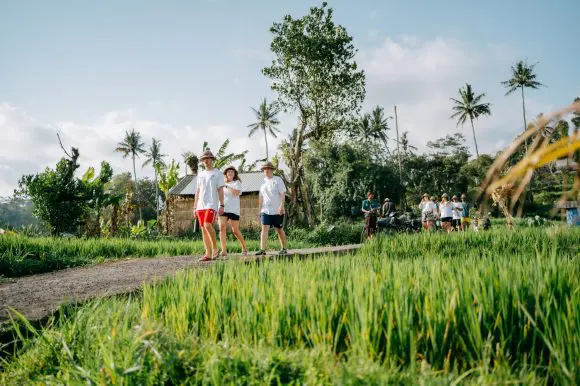
- Fuels and removals tackle future risk: Investing in Sustainable Aviation Fuel (SAF) and permanent carbon removals helps reduce or remove emissions that would otherwise accelerate global warming. This work is crucial for bending the global emissions curve.
- Adaptation tackles present risk: Communities on the front line of climate change can’t wait for global emissions reductions to take full effect. Adaptation protects lives, livelihoods, and ecosystems right now, ensuring people can withstand the shocks that are already here.
- Justice and fairness: The emissions created by international flights are largely borne by wealthier countries, but the harshest consequences fall on small island states and coastal communities. Supporting adaptation in these regions is a matter of climate justice as well as climate science.
- Holistic impact: By combining investments in fuel innovation, removals, and adaptation, we balance urgent emission reductions with immediate resilience-building. This is how we ensure our Climate Fund drives both global and local change.
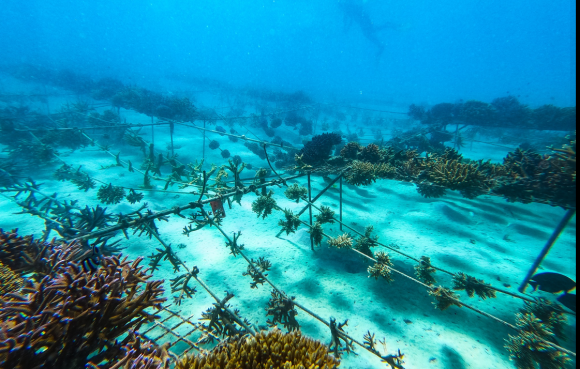
The Coral Coast Conservation Center is a charitable trust founded in Fiji in late 2018. While the organisation is relatively new, they are closely associated with Reef Explorer Fiji Ltd, a research & development company founded in 2005, and from the end of 2020 will be operating all of the research, educational, conservation, and community development projects that have been ongoing through Reef Explorer over the years.
The mission of the Coral Coast Conservation Center is to promote the management, conservation and sustainable development of Fiji’s natural resources through integrated research, education, income, generating and capacity building initiatives.
The aim to support community-based environmental management effort (specifically marine) and help ensure the sustainable use and conservation of Fijian and regional resources. Additional, we aim to be a resource center for local communities to provide information, guidance, and advice to support sustainable development efforts. We envision further developing educational opportunities for both local and international students, as well as training and capacity building in marine management and related activities. We plan to further develop our field station as well as expand the research partners / educational institutions we work with and who send students to conduct their research in Fiji.
Our vision for Fiji is well-managed marine resources (communities, gov’t, and NGOs in partnership), healthy and resilient communities, and qualified and capable civil servants supporting sustainable development and environmental management.
As a new organization, we need to establish a website so potential international clients, project partners, and donors can learn more about us and our ongoing efforts and plans. Financial support for overhead (staff, field station rent & upkeep, computer/camera equipment – core funding), field station/facility development, acquisition of a vehicle, and ongoing projects (research and conservation) is always a challenge. We are always looking for donors, grants to apply for, and new institutions/clients to engage with for educational programs. As we spend a lot of time looking for and applying for funding, we don’t have enough time to spend publishing all our research in peer-reviewed journals for broader dissemination of information.
By joining a Think Pacific experience, you’re travelling in a way that is fairer. That supports local communities, whilst working towards a global effort to tackle the climate crisis in a transparent way.
Together, we can travel responsibly, invest wisely, and protect the future.

